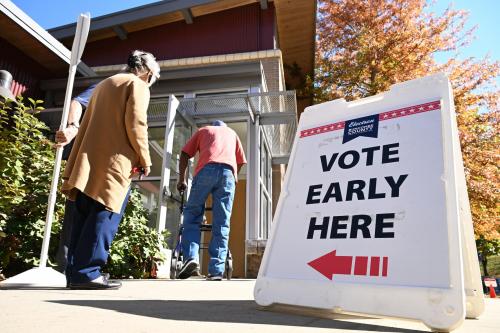The day after the 2024 election, it appeared that Republicans had won a sweep of major dimensions—a powerful public endorsement of President (and President-elect) Trump. As more data and analysis came in, however, the picture came into sharper focus. What it reveals is not a pro-MAGA realignment or a sweeping repudiation of Democrats. Rather, this was an ordinary election.
While former President Trump did manage to get a popular vote majority this time (a real surprise to most observers), 2024 was an almost identical repeat of 2016. Compared with 2016, only Nevada flipped as of now. While the 2024 exit polls show that most categories of voters shifted toward Trump compared to 2020, the more appropriate baseline for comparison is 2016, the last time Trump ran not as an incumbent but as a challenger; against that baseline, there was remarkable little change, except for an ongoing shift of Hispanics toward the kind of bipartisanship historically seen among immigrant ethnic groups (for example, Italians) as they integrate and diversify.
When one considers all that has transpired since 2016, this stasis is remarkable if not downright peculiar. It supports the thesis of the political scientists John Sides, Chris Tausanovitch, and Lynn Vavreck that in recent years, national politics has been “calcified,” with two more or less equal-sized coalitions at loggerheads, resulting in Groundhog Day-style repeat elections in which small vote fluctuations (a few votes in a few places) cause large oscillations in outcomes and policies.1
Moreover, as the political strategist Matthew Dowd points out, no modern incumbent president or vice president has run in the popular vote ahead of the president’s approval rating—until now. President Biden’s rating on Election Day was in the high 30s to low 40s (depending on the poll), a gale-force headwind of unpopularity. Moreover, voters’ top two concerns were the economy and (secondarily) immigration, issues which favored the GOP. Yet even in this harshly unfavorable environment, Harris (as of now) won 48.1%, beating Biden’s approval by a wide margin and holding Trump to below 51%. In other words, if anything, she overperformed, probably because of the years of controversies and legal problems surrounding the Republican candidate.
Election results are always Rorschach tests, so people attribute them to whatever hobbyhorse they’re riding. If you think the Democrats lean too far left, Harris should have had a “Sister Souljah” moment; if you think the Democrats lean too far right, Harris should have run on a populist economic agenda; and so forth.2 Overall, though, 2024 mainly reaffirms voters’ persistent anti-incumbent sentiment—not only in the United States but around the world. In 2020, Biden and his party were the vehicle to punish the incumbent party; in 2016 and again in 2024, Trump and his party were the vehicle. Wash, rinse, repeat.
Continually cycling elections is not a good groove to be stuck in. Democracies are not governable if the voters treat every election as an opportunity to punish whoever is in power. But for some voters, that’s still better than a political realignment behind either party.
While the Republicans undoubtedly scored a clear victory, they may be tempted to claim a stronger mandate than the voters intended to deliver—and they may respond with policies that are more extreme and disruptive than the public wants or expects, leading to their own donnybrook in 2026 or 2028. Above all, as The Atlantic’s Ron Brownstein notes, Republicans need to deliver wage gains and low inflation. The support they have won is conditional, and the Democrats have lost a set, not the match.
-
Footnotes
- There’s more about that from Sides et al. here and here, and from Lee Drutman of New America here (“Perfectly Balanced, Totally Unstable”).
- A “Sister Souljah” moment refers to a comment then Candidate Bill Clinton made against a Black rapper whose music advocated killing white people. It has come to mean a point at which a candidate takes on the base of their party.
The Brookings Institution is committed to quality, independence, and impact.
We are supported by a diverse array of funders. In line with our values and policies, each Brookings publication represents the sole views of its author(s).








Commentary
An ordinary election
November 13, 2024